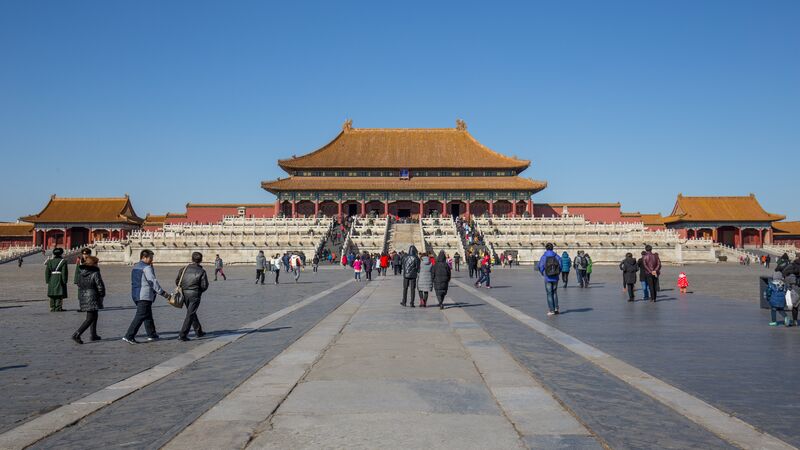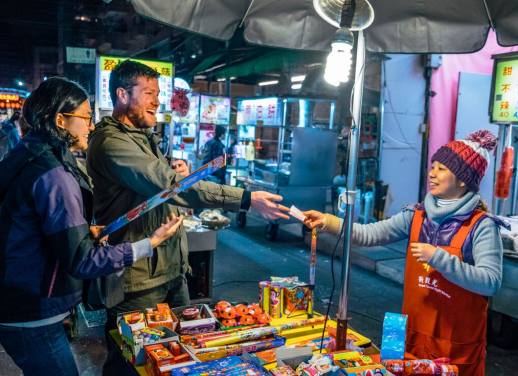As a travel writer I am lucky enough to have explored more than 40 countries, but there’s something about Beijing that gets under my skin every time. Of all the places I’ve visited, from Mexico to Mongolia, Beijing is where I feel the most out of place.
Since it developed free of Western influence for more than 5,000 years, it should come as no surprise that Chinese society is governed by a mysterious web of laws and etiquette that are very different from what you may be used to back home.
These differences are all the more obvious, given that it’s still a Communist country. Political figures such as Chairman Mao are still adored, as proven by the hundreds of people who travel from all over the country to pay their respects at his tomb every day.
INTREPID HAS A RANGE OF SMALL GROUP ADVENTURES THROUGH CHINA – CHECK THEM OUT HERE
From getting lost in the warren of winding hutongs (alleyways that have changed little from when they were built in the 13th century) to watching an elderly man train his pet crickets, a cultural experience that baffles, awes and amuses never fails to emerge every time you leave your hotel room.
While the cultural differences are so vast they can be a little bewildering, Beijing belongs on everyone’s bucket list. Here are my top tips:
1. Brush up on your manners before entering someone’s home
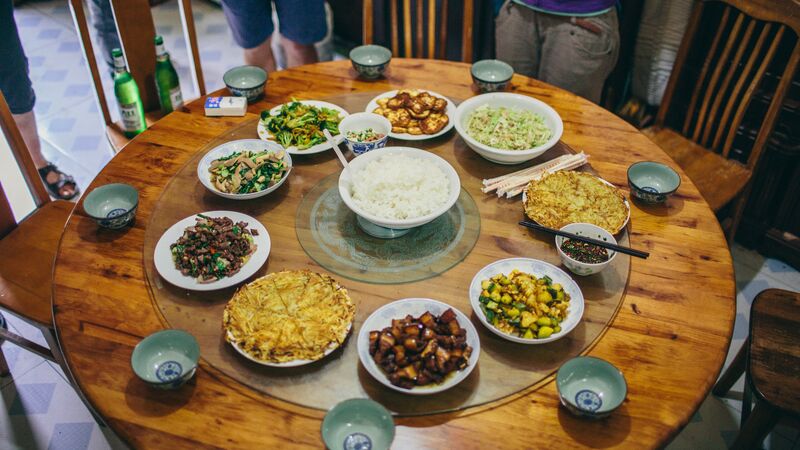 Hotels in Beijing are expensive, however homestays can provide the chance to have meaningful encounters with locals. On our visit, we stayed with the daughter of a government official who taught us how to make dumplings and lily root salad. However, we hadn’t done our homework on shoe etiquette and ended up putting our trainer-clad foot in it on several occasions.
Hotels in Beijing are expensive, however homestays can provide the chance to have meaningful encounters with locals. On our visit, we stayed with the daughter of a government official who taught us how to make dumplings and lily root salad. However, we hadn’t done our homework on shoe etiquette and ended up putting our trainer-clad foot in it on several occasions.
GET A TASTE FOR LOCAL LIFE ON OUR 19-DAY CHINA EXPERIENCE TOUR – FULL DETAILS HERE
It is polite to remove your shoes as soon as you arrive at someone’s home; most people keep a stash of ‘visitors slippers’ (typically brightly coloured plastic sliders that will be several sizes too small) by the door. They may not be the comfiest things in the world, but it’s more polite to slip a pair on than walk around in socks. When using the bathroom, there will be slippers in a different colour waiting by the door. Leave your house slippers outside and don bathroom slippers while using the facilities. And of course, never wander around the house in bathroom slippers, unless you want to horrify your host!
It is also polite to bring a gift. Being British, we picked up a few packets of toffee in tins shaped like London buses at the airport and these went down well, particularly given that red is considered lucky. Flowers, fruit (except pears) or tea are all acceptable, although things coloured black and white are best avoided; black is associated with dishonesty and white is the colour of funerals.
2. How to nail dining decorum
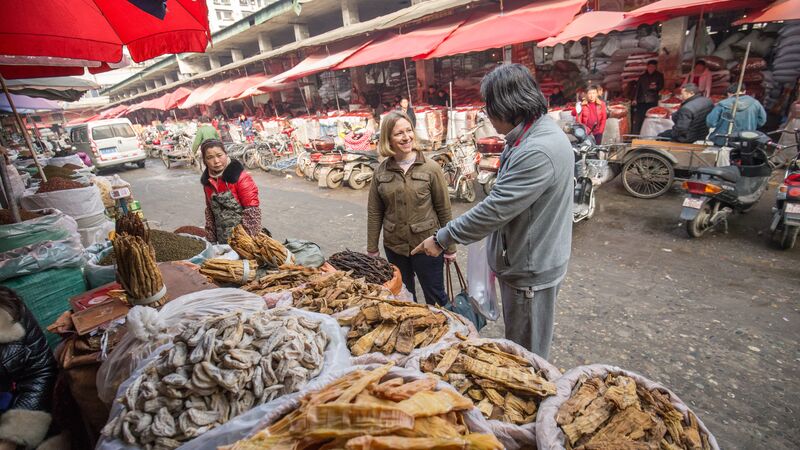 Food is central to Chinese culture and Beijing’s restaurant scene is as varied as the ingredients that bubble in its hot pots. Whether you’re strolling down Guij (Ghost Street) for late night spicy crayfish, or tucking into recipes that were originally only available to the emperor at Fangshan Restaurant (founded by former imperial chefs after the Qing Dynasty fell), a meal in Beijing is always a cultural immersion.
Food is central to Chinese culture and Beijing’s restaurant scene is as varied as the ingredients that bubble in its hot pots. Whether you’re strolling down Guij (Ghost Street) for late night spicy crayfish, or tucking into recipes that were originally only available to the emperor at Fangshan Restaurant (founded by former imperial chefs after the Qing Dynasty fell), a meal in Beijing is always a cultural immersion.
The key thing to remember is that everything you’ve been taught about table manners is irrelevant. Burping, chewing with your mouth open, and slurping are all actively encouraged. However, sticking your chopsticks straight up in a bowl of rice is the ultimate faux pas, as it looks like the incense sticks which are lit as an offering for the dead.
It is not usual to split the bill. Rather, the host or most senior person at the table will cover it all, and offering to pay a share will cause offence. There is also no tipping culture, as we learned after a mortified waitress chased us two blocks to give us back the extra yuan we’d left on the table.
AVOID FOODIE FAUX PAS ON A 12-DAY REAL FOOD ADVENTURE AROUND CHINA – FULL DETAILS HERE
3. Don’t feel entitled to special treatment
 While in many cultures you feel like a rockstar just for being Western, this is not the case in Beijing.
While in many cultures you feel like a rockstar just for being Western, this is not the case in Beijing.
Although locals are generally very courteous, some regard Westerners with shyness and most don’t speak English, which makes asking for directions tricky. Always pre-plan your route when you have wifi and ask hotel staff to write key addresses in Chinese, so you have something to show to taxi drivers.
Similarly, be accepting of the fact that some establishments would rather not have Westerners there. One evening, we stumbled into a shadowy neighbourhood bar in Xisi and were discreetly led outside by a soft-spoken barman who murmured to us in Mandarin before closing the door. In fact he was so polite, it took us a while to realise that we had just been thrown out!
While this may come as a bit of a shock, Beijing’s fiercely independent spirit and refusal to put Western culture on a pedestal is one of the main reasons it’s such a rewarding destination. If you’re looking for nightlife, check out Wudaoying Hutong, a hipster haven complete with bars, cool cafes and design boutiques.
4. Be tech savvy
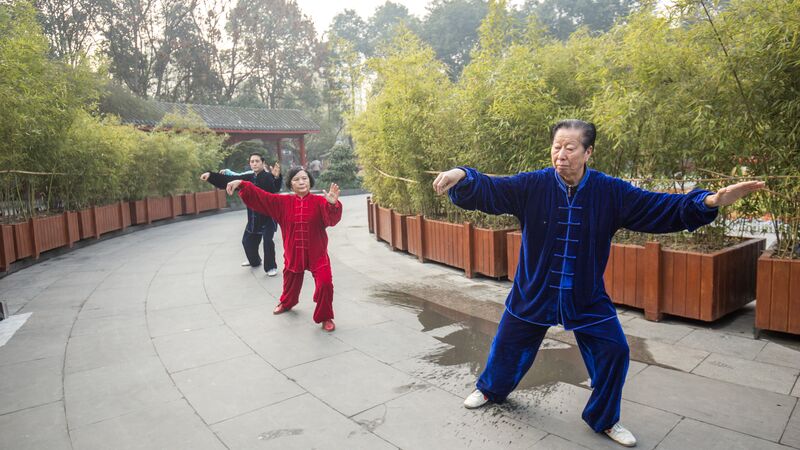 China may have led the way on innovations such as electric cars, robots and micro-chips, but the experience of using everyday tech while on holiday there can come as a bit of a shock for Westerners.
China may have led the way on innovations such as electric cars, robots and micro-chips, but the experience of using everyday tech while on holiday there can come as a bit of a shock for Westerners.
If you’re planning on meeting locals or staying at homestays, it’s worth downloading WeChat; this is how most people communicate. Similarly, you’ll have to go cold Turkey on social media. Facebook, Twitter, Snapchat, WhatsApp, Pinterest and Instagram are all blocked in China, as is Google. Save those holiday uploads for the flight home!
RELATED: ACTIVE TRAVELLER? HERE’S WHY YOU SHOULD VISIT CHINA
5. And finally… follow the locals when crossing roads
Beijing’s road system is as convoluted as a bowl of noodles and it’s common for roads to have as many as 10 lanes. While there are traffic lights, people tend to simply walk out into the traffic, which magically seems to part around them. Try and stick close to a group of pedestrians and follow their lead.
China can be a difficult country to navigate on your own. Get the lay of the land with an expert local leader on a small group adventure with Intrepid – explore our range of tours now.

